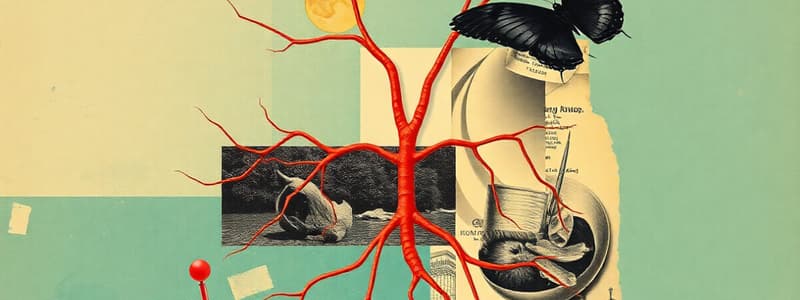Podcast
Questions and Answers
Which division of the autonomic nervous system is primarily responsible for the 'fight or flight' response?
Which division of the autonomic nervous system is primarily responsible for the 'fight or flight' response?
- Central nervous system
- Sympathetic division (correct)
- Somatic division
- Parasympathetic division
The somatic nervous system only controls involuntary muscle movements.
The somatic nervous system only controls involuntary muscle movements.
False (B)
What is the first component of the reflex arc that receives stimuli?
What is the first component of the reflex arc that receives stimuli?
Receptor
The ______________ division of the autonomic nervous system is responsible for regulating digestive processes.
The ______________ division of the autonomic nervous system is responsible for regulating digestive processes.
Match the following parts of the autonomic nervous system with their primary functions:
Match the following parts of the autonomic nervous system with their primary functions:
Flashcards are hidden until you start studying
Study Notes
Autonomic Nervous System
- Part of the nervous system responsible for regulating involuntary bodily functions
- The autonomic nervous system is a subdivision of the peripheral nervous system that controls involuntary actions
- Includes the sympathetic and parasympathetic divisions
Organization
- The reflex arc is a pathway that mediates a reflex action.
- It consists of five components:
- Receptor: detects the stimulus by being excited
- Afferent nerve: transmits the impulse to the central nervous system (CNS)
- Center: processes the information in the CNS and determines the appropriate response
- Efferent nerve: carries the motor impulse from the CNS to the effector organ
- Effector organ: responds to the impulse to produce the reflex action
Autonomic Ganglia
- These are collections of nerve cell bodies that are located outside the CNS and are part of the autonomic nervous system.
Sympathetic Division
- One of the main divisions of the autonomic nervous system
- Primarily responsible for the "fight-or-flight" response, preparing the body for stressful situations
- It is organized into four main parts:
- Cervical: originates in the spinal cord and relays signals for functions like eye dilation, salivary gland activity, and skin regulation
- Cardiopulmonary: originates in the spinal cord and relays signals to the heart and lungs
- Splanchnic: originates in the spinal cord and further divides:
- Abdominal: impacts gastrointestinal motility, secretions, blood vessel constriction, liver function, adrenal medulla, and spleen
- Pelvic: relates to the colon, urinary bladder, blood vessels and sexual functions
Horner`s Syndrome
- A condition that results from damage to the sympathetic nervous system
- It affects one side of the face and can cause:
- Drooping eyelid (ptosis)
- Constricted pupil (miosis)
- Decreased sweating (anhidrosis)
- Facial flushing
- Conjunctival injection (redness of the eye)
Sympathetic Divisions - Key Functions
- Cervical:
- Controls functions in the eyes (e.g., pupillary dilation), salivary glands, and skin
- Cardiopulmonary:
- Controls heart rhythm (e.g., increased heart rate), blood vessel dilation, and lung bronchodilation
- Splanchnic:
- Abdominal: Impacts gastrointestinal tract functions, including motility, secretions, blood vessel constriction, and liver function
- Pelvic: Relates to colon function, urinary bladder function, blood vessel control and sexual (male and female) functions
- Pelvic:
- Male: controls ejaculation
- Female: controls the uterus and sexual function
Studying That Suits You
Use AI to generate personalized quizzes and flashcards to suit your learning preferences.




